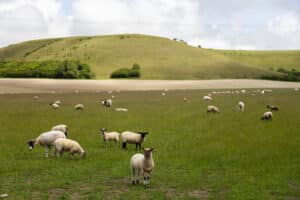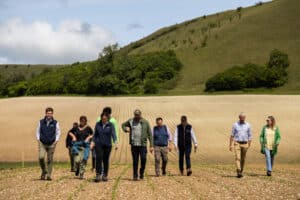Last month, our UK team hosted an event at Wood Farm in Mere, in collaboration with RJ Coward & Son, showcasing sustainable farming practices. The day brought together sustainability leaders from across the food and drink, charity, and agricultural industry, including representatives from the Food and Drink Federation (FDF), WRAP, Ample, the Duchy of Cornwall, The Felix Project, and FareShare.


Wood Farm has been in the Coward family since 1963, with a lineage in Mere dating back to the 1500s. Today, the farm is a living example of regenerative agriculture, operating under the Sustainable Farming Incentive (SFI) and Higher-Level Scheme (HLS), and contributing to the Duchy of Cornwall’s sustainability initiatives. The 700-acre site spans a diverse landscape, from clay lowlands to ancient downland, and supports nearly 1,000 sheep alongside a variety of crops including wheat, barley, maize, and cover crops.
The morning began with a guided tour of the farm, offering attendees a first-hand look at how sustainability schemes are applied in practice, from cover cropping, herbal leys, and soil health monitoring to biodiversity protection and carbon tracking. Each initiative was explained in terms of its purpose, benefits, and practical implications. Attendees also gained insight into crop rotations, the impact of invasive plant species, and how factors such as weather and volatile markets directly influence farm production.
After a locally sourced buffet lunch, the afternoon session focused on open discussion. RJ Coward & Son shared their experience navigating the evolving landscape of British agriculture, the challenges of navigating subsidy schemes, shifting customer expectations, and the uncertainty associated with British farming currently.
Three key takeaways from the day:
- Sustainability is farm-specific: There is no one-size-fits-all approach. Each farm’s landscape, soil type, and operational model determine which sustainability practices are most effective and viable
- Navigating environmental subsidies is complex: Farmers face a maze of evolving schemes, each with different requirements and applicability. Understanding which to apply for demands significant time, knowledge, and administrative effort—adding layers of complexity to an already demanding role
- Agriculture is an ever-changing environment: From shifting subsidy structures to unpredictable weather and emerging challenges like blackgrass, farmers must constantly adapt. The sector’s volatility underscores the need for resilience and long-term thinking in sustainability planning
The event sparked rich discussion, valuable networking, and a deeper appreciation for the realities of sustainable farming in the UK. We would like to thank all the guests who attended, and RJ Coward & Son for their hospitality and collaboration.
Find out more:
Our sustainability offering
Join our Connect community, for future events
Contact us


